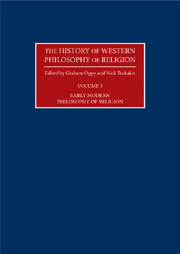Book contents
- Frontmatter
- Contents
- Editorial Introduction
- Contributors
- 1 Early Modern Philosophy of Religion: An Introduction
- 2 Niccolò Machiavelli
- 3 Martin Luther
- 4 John Calvin
- 5 Michel de Montaigne
- 6 Francisco Suárez
- 7 Thomas Hobbes
- 8 René Descartes
- 9 Ralph Cudworth
- 10 Blaise Pascal
- 11 Baruch Spinoza
- 12 John Locke
- 13 Gottfried Wilhelm Leibniz
- 14 George Berkeley
- 15 Voltaire
- 16 The Deists
- 17 Jonathan Edwards
- 18 Thomas Reid
- 19 David Hume
- 20 Denis Diderot
- 21 Immanuel Kant
- 22 Gotthold Ephraim Lessing
- 23 William Paley
- Chronology
- Bibliography
- Index
11 - Baruch Spinoza
- Frontmatter
- Contents
- Editorial Introduction
- Contributors
- 1 Early Modern Philosophy of Religion: An Introduction
- 2 Niccolò Machiavelli
- 3 Martin Luther
- 4 John Calvin
- 5 Michel de Montaigne
- 6 Francisco Suárez
- 7 Thomas Hobbes
- 8 René Descartes
- 9 Ralph Cudworth
- 10 Blaise Pascal
- 11 Baruch Spinoza
- 12 John Locke
- 13 Gottfried Wilhelm Leibniz
- 14 George Berkeley
- 15 Voltaire
- 16 The Deists
- 17 Jonathan Edwards
- 18 Thomas Reid
- 19 David Hume
- 20 Denis Diderot
- 21 Immanuel Kant
- 22 Gotthold Ephraim Lessing
- 23 William Paley
- Chronology
- Bibliography
- Index
Summary
Baruch Spinoza was born in Amsterdam on 24 November 1632. He was the son of a merchant family of Jews originally from Portugal. His family were ‘conversos’, that is, Jews from the Iberian Peninsula who had been forcibly converted to Christianity and had immigrated to the Dutch Republic at the end of the sixteenth century in order to live openly as Jews again. The Dutch had admitted them to Amsterdam because of their useful links to trade and their contribution to the economy. They were extended a limited but relatively generous toleration for their religious practices. But owing to the complex background of many of the members of the community there were numerous internal conflicts over beliefs. Spinoza himself received a traditional Jewish education and knew many of the important rabbis in Amsterdam, including Menasseh ben Israel, the kabbalist Isaac Aboab da Fonseca, and the rationalist Saul Levi Mortera. He also took advantage of the intellectual and cosmopolitan city, which afforded him other means to expand his education. He learned Latin and the classics, primarily with the radical former Jesuit, Franciscus van den Enden. His own unorthodox views eventually, on 27 July 1656, led the leaders of his congregation to pronounce a ban (cherem), which ostracized him from the Jewish community. Spinoza stayed in Amsterdam and deepened his relations with other freethinkers, many of whom were members of dissident Protestant sects, such as the Collegiants.
- Type
- Chapter
- Information
- The History of Western Philosophy of Religion , pp. 141 - 152Publisher: Acumen PublishingPrint publication year: 2009

